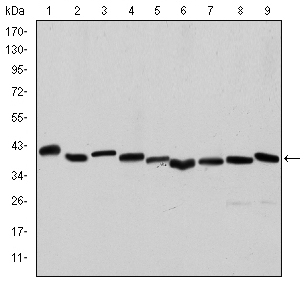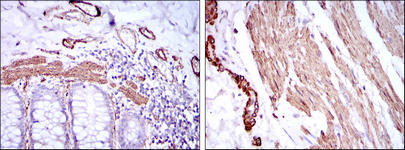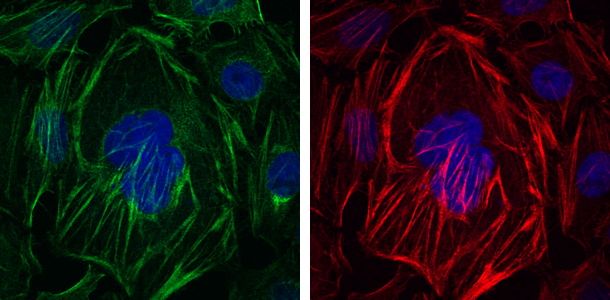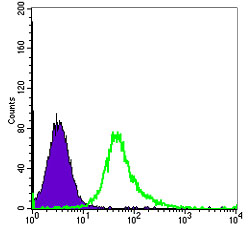ACTA2 Monoclonal Antibody
- Catalog No.:YM0011
- Applications:WB;IHC;IF;FCM;ELISA
- Reactivity:Human;Mouse;Rat;Monkey
- Target:
- ACTA2
- Fields:
- >>Vascular smooth muscle contraction;>>Apelin signaling pathway;>>Relaxin signaling pathway
- Gene Name:
- ACTA2
- Protein Name:
- Actin, aortic smooth muscle
- Human Gene Id:
- 59
- Human Swiss Prot No:
- P62736
- Mouse Gene Id:
- 11475
- Mouse Swiss Prot No:
- P62737
- Rat Gene Id:
- 81633
- Rat Swiss Prot No:
- P62738
- Immunogen:
- Synthesized peptide of human ACTA2.
- Specificity:
- ACTA2 Monoclonal Antibody detects endogenous levels of ACTA2 protein.
- Formulation:
- Liquid in PBS containing 50% glycerol, 0.5% BSA and 0.02% sodium azide.
- Source:
- Monoclonal, Mouse
- Dilution:
- WB 1:500 - 1:2000. IHC 1:200 - 1:1000. IF 1:200 - 1:1000. Flow cytometry: 1:200 - 1:400. ELISA: 1:10000. Not yet tested in other applications.
- Purification:
- Affinity purification
- Storage Stability:
- -15°C to -25°C/1 year(Do not lower than -25°C)
- Other Name:
- ACTA2;ACTSA;ACTVS;GIG46;Actin; aortic smooth muscle;Alpha-actin-2;Cell growth-inhibiting gene 46 protein
- Molecular Weight(Da):
- 42kD
- References:
- 1. J Hum Genet. 2009 Nov;54(11):687-8.
2. Hum Mutat. 2009 Oct;30(10):1406-11.
- Background:
- The protein encoded by this gene belongs to the actin family of proteins, which are highly conserved proteins that play a role in cell motility, structure and integrity. Alpha, beta and gamma actin isoforms have been identified, with alpha actins being a major constituent of the contractile apparatus, while beta and gamma actins are involved in the regulation of cell motility. This actin is an alpha actin that is found in skeletal muscle. Defects in this gene cause aortic aneurysm familial thoracic type 6. Multiple alternatively spliced variants, encoding the same protein, have been identified. [provided by RefSeq, Nov 2008],
- Function:
- disease:Defects in ACTA2 are the cause of aortic aneurysm familial thoracic type 6 (AAT6) [MIM:611788]. AATs are characterized by permanent dilation of the thoracic aorta usually due to degenerative changes in the aortic wall. They are primarily associated with a characteristic histologic appearance known as 'medial necrosis' or 'Erdheim cystic medial necrosis' in which there is degeneration and fragmentation of elastic fibers, loss of smooth muscle cells, and an accumulation of basophilic ground substance.,function:Actins are highly conserved proteins that are involved in various types of cell motility and are ubiquitously expressed in all eukaryotic cells.,miscellaneous:In vertebrates 3 main groups of actin isoforms, alpha, beta and gamma have been identified. The alpha actins are found in muscle tissues and are a major constituent of the contractile apparatus. The beta and gamma actin
- Subcellular Location:
- Cytoplasm, cytoskeleton.
- Expression:
- Pituitary,Uterus,
- June 19-2018
- WESTERN IMMUNOBLOTTING PROTOCOL
- June 19-2018
- IMMUNOHISTOCHEMISTRY-PARAFFIN PROTOCOL
- June 19-2018
- IMMUNOFLUORESCENCE PROTOCOL
- September 08-2020
- FLOW-CYTOMEYRT-PROTOCOL
- May 20-2022
- Cell-Based ELISA│解您多样本WB检测之困扰
- July 13-2018
- CELL-BASED-ELISA-PROTOCOL-FOR-ACETYL-PROTEIN
- July 13-2018
- CELL-BASED-ELISA-PROTOCOL-FOR-PHOSPHO-PROTEIN
- July 13-2018
- Antibody-FAQs
- Products Images

- Western Blot analysis using ACTA2 Monoclonal Antibody against HeLa (1), A431 (2), Jurkat (3), K562 (4), HEK293 (5), HepG2 (6), NIH/3T3 (7), PC-12 (8) and Cos7 (9) cell lysate.

- Immunohistochemistry analysis of paraffin-embedded human duodenum tissues (left) and human esophagus tissues (right) with DAB staining using ACTA2 Monoclonal Antibody.

- Immunofluorescence analysis of HepG2 cells using ACTA2 Monoclonal Antibody (green). Red: Actin filaments have been labeled with Alexa Fluor-555 phalloidin. Blue: DRAQ5 fluorescent DNA dye.

- Flow cytometric analysis of Hela cells using ACTA2 Monoclonal Antibody (green) and negative control (purple).




